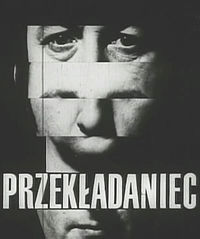Difference between revisions of "Roly-poly: film 1968"
| (One intermediate revision by the same user not shown) | |||
| Line 34: | Line 34: | ||
}} | }} | ||
| − | + | a science-fiction comedy directed by Andrzej Wajda, a famous Polish film director, awarded Oscar for a lifetime achievement in 2002. The screenplay entitled "Przekladaniec" (Layer Cake, Roly-poly) was written by Lem himself. It was based on his short story "Czy pan istnieje, Mr. Johns?" ("Do you exist, Mr. Johns?") The main character is a racing driver Richard Fox. During his career, as a consequence of rally crashes, a number of his internal organs are replaced with transplants and it seems that Fox starts to exhibit some of the personalities of the donors. This creates doubts about his legal status and identity. | |
| − | + | Grotesque vision of the future allowing for unlimited transplantations leads to the diffusion of the individual self. The story moving at a lively pace asks a penetrating question: how much of Richard Fox remained in Richard Fox? | |
| + | |||
| + | The movie is one of the very few adaptations of his works that Lem actually liked: "I felt fully satisfied with Wajda's "Roly-poly" - he stated in "Tako rzecze… Lem" (p. 161). A letter written by Lem to Wajda dated August 20th, 1968 stated: "Both your work, the actors' performance and the stage design were great. (…) "Future" that is close but unspecified was created in an ingenious way, especially considering the modest means you employed". | ||
[[Category:Adaptations]] | [[Category:Adaptations]] | ||
Latest revision as of 16:53, 31 October 2011
| Przekładaniec | |
|---|---|
 | |
| Genre | science fiction, comedy |
| Directed by | Andrzej Wajda |
| Produced by | Zespół Filmowy Kamera |
| Screenplay by | Stanisław Lem |
| Based on |
Czy Pan istnieje, Mr. Jones by Stanisław Lem |
| Starring | Bogumił Kobiela, Anna Prucnal and Jerzy Zelnik |
| Music by | Andrzej Markowski |
| Cinematography | Wiesław Zdort |
| Editing by | Halina Prugar-Ketling |
| Production company | TVP |
| Country | Poland |
| Language | Polish |
| Original channel | TVP |
| Release date | March 17, 1968 (Poland) |
| Running time | 35 min |
a science-fiction comedy directed by Andrzej Wajda, a famous Polish film director, awarded Oscar for a lifetime achievement in 2002. The screenplay entitled "Przekladaniec" (Layer Cake, Roly-poly) was written by Lem himself. It was based on his short story "Czy pan istnieje, Mr. Johns?" ("Do you exist, Mr. Johns?") The main character is a racing driver Richard Fox. During his career, as a consequence of rally crashes, a number of his internal organs are replaced with transplants and it seems that Fox starts to exhibit some of the personalities of the donors. This creates doubts about his legal status and identity.
Grotesque vision of the future allowing for unlimited transplantations leads to the diffusion of the individual self. The story moving at a lively pace asks a penetrating question: how much of Richard Fox remained in Richard Fox?
The movie is one of the very few adaptations of his works that Lem actually liked: "I felt fully satisfied with Wajda's "Roly-poly" - he stated in "Tako rzecze… Lem" (p. 161). A letter written by Lem to Wajda dated August 20th, 1968 stated: "Both your work, the actors' performance and the stage design were great. (…) "Future" that is close but unspecified was created in an ingenious way, especially considering the modest means you employed".